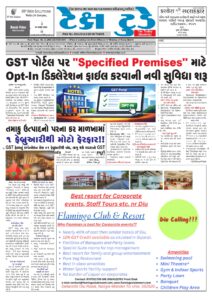GST WEEKLY UPDATE : 47/2021-22 (20.02.2022) By CA Vipul Khandhar

By C A Vipul Khandhar,
- GSTN enabled feature to withdraw GST registration cancellation application:
- The Goods and Services Tax Network (GSTN) has enabled the feature to withdraw application for cancellation of GST registration on the GST portal. If the application for cancellation of GST registration is made by mistake and the applicant wishes to withdraw the application, then that may be withdrawn so now by following below mentioned steps:
- Go to the Common Portal and post login navigate through Services → User Services → View My Submissions
- Click on the “Withdraw” button available beside your Application for Cancellation of Registration
- Click on Confirm and your application will be withdrawn.
- GST Alert! Tax department asks taxpayers to complete this pending work:
- Attention GST Taxpayers whose Aggregate Annual Turnover for the FY 20-21 is more than Rs.5 crore. .
File your Annual Return in Form GSTR-9 along with self-certified Reconciliation statement in GSTR-9C before February 28, 2022. - Attention GST Taxpayers whose aggregate annual turnover for the FY 20-21 is more than Rs.2 crore. .
File Annual Return in Form GSTR-9 before February 28, 2022.
- GSTN enabled window to opt in for composition scheme for the FY 2022-23:
The Goods and Services Tax Network (“GSTN”) has enabled window to opt in for composition scheme for the FY 2022-23 on GST Portal for the taxpayers. The eligible taxpayers, who wish to avail the composition scheme may opt in for composition before March 31, 2022.
- GSTR-3B have now Tax Liability Tab:
After ‘Make Payment’ step, this tab gets enabled
Bifurcation of Outward Liability of previous Month/s included in Current GSTR-3B can be provided, for Correct calculation of System Computed Interest.
- Setup of ‘GST Refund Help Desk’ in the office of Pr. CCA, CBIC:
The office of Pr. CCA, CBIC has setup a ‘GST Refund Help Desk’ for addressing payment related problems faced by the taxpayers. Contact details of the Help Desk is as under:
Name of Nodal Officer: Ms. Anita Rawat, Accounts Officer
Toll Free Helpline Number: 1800-11-1424
Mail ID: gstrefunds-helpdesk@gov.in
For payment/disbursement related issues in their refund application, the taxpayers are informed to contact this GST Refund help desk.
- DGFT introduce online IT Module for filing applications w.r.t. issuance of replenishment authorisation for Gems & Consumables w.e.f. Feb 21, 2022:
As part of IT Revamp of its exporter/importer related services, this Directorate now introduces a new online module for filing of electronic, paperless applications for Issuance of Replenishment Authorisation as per Para 4.35 and 4.36 of FTP for Gems and Consumables from new online IT Module w.e.f. February 21, 2022. All applicants seeking Replenishment Authorization for Gems and Consumables may apply online by navigating to the DGFT website (https://www.dgft.gov.in/CP/ → Services).
- Infosys has issued guideline for the DSC error:
- Troubleshooting Errors When Using DSC When you try to register a Digital Signature Certificate (DSC) or upload a form with signature on it, you may face errors such as,
- “Your Certifying Authority (CA) is not trusted. Please use a trusted CA”.
- “User Id against this Digital Certificate already exists.”
- “Your certificate has been revoked.”
Let us look at the steps to fix the mentioned errors.
Steps to Troubleshoot Error:
- Open the Internet Explorer.
- In the Internet Explorer, select the Tools > Internet Options command.
- The Options dialogue box is displayed. Click the Content tab.
- Under the Certificates section, click the Certificates button.
- The Certificates dialogue box is displayed. The dialogue box displays a list of certificates that are installed on the computer. Select the correct certificate and click the View button to open the certificate.
- Clarification By Rajasthan SGST Department:
Classification for the lime under HSN. “Under the GST central excise tariff has been aligned with HSN which lay down that quick lime and hydrated lime having purity greater then 98%is classifiable under chapter 28 of the GST tariff where as quick lime containing less than 98% calcium oxide and slaked lime containing less than 98% calcium hydroxide fall under heading 2522”.
- Kerala GST Department has introduced Tax Payer Card for taxpayers:
Kerala GST Department has introduced Tax Payer Card for taxpayers registered in Kerala to rate their diligence in filing returns on time and payment of taxes.
A taxpayer card:
This is a scoring scheme for registered persons who are prompt in filing monthly returns and paying taxes. It helps in categorizing the suppliers according to their compliance.
- Scoring Scheme
- Timely filing of GSTR1 abd 3B within due dates – 50 marks
- Timely filing of Annual return within due dates – 30 marks
- Proper and accurate filing of 3B compared with R1, E-way bill data, GSTR-7 – 20 marks
- Important Judgements & AARs:
(i) Gujarat Highcourt Decision Regarding Electronic Credit Ledger can be blocked under GST Rules 2017 only if credit balance is available:
(Applicant – SAMAY ALLOYS INDIA PVT. LTD)
The Gujarat High Court has recently held that the power prescribed under Rule 86A of the GST Rules 2017 to block an electronic credit ledger can be exercised only when there is availability of credit in such ledger, alleged to be ineligible.
“Condition precedent for exercise of power under Rule 86A of the GST Rules is the availability of credit in the electronic credit ledger which is alleged to be ineligible. If credit balance is available, then the authority may, for reasons to be recorded in writing, not allow the debit of amount equivalent to such credit. However, there is no power of negative block for credit to be availed in future,”
The Bench allowed the writ application and directed the Respondent to withdraw the negative block of electronic credit ledger at the earliest. Further, it was held that the condition precedent for the exercise of power under Rule 86-A of GST Rules is the availability of credit in the electronic credit ledger. The Court clarified that if the credit balance is available then the authority may (with reasons recorded in writing) not allow debit of amount equivalent to the given credit. With this, the Bench ruled that the Applicants were entitled to a refund of INR 20 lakh.
(ii) Commissioner Appeals – GST – Goa Regarding Refund of unutilised ITC due to exports can’t be curtailed based on prospective amendment to provisions:
(Applicant – Lankhorst Euronete India (P.) Ltd)
Prior to February 01, 2019, for the purpose of claiming refund of accumulating input tax credit (‘ITC’) on account of zero rated supply, the relevant date for the same was determined under the following two separate clauses of the definition of relevant date under Section 54 of the CGST Act, 2017:
Clause (a) – In the case of goods exported out of India by sea or air, the relevant date would be the date on which ship/aircraft on which goods are loaded, leaves India i.e. Date of Shipping bill.
Clause (e) – In the case of refund of unutilised input tax credit under Section 54(3) of the CGST Act, the relevant date would be end of the financial year in which such claim for refund arises.
With effect from February 01, 2019, the CGST Amendment Act, 2018 substituted the clause (e) to merely cover the scenarios of Inverted Duty structure. Therefore, after the amendment, the relevant date for claiming refund of accumulating input tax credit on account of zero rated supply would be determined as per the clause (a) provided above.
As per the facts of the case, the appellant applied for the refund claim of ITC on account of the export of goods. The date of filing of shipping bill was March 1, 2018. Therefore, as per the amended provision, the relevant date would be 2 years from the date of filing of shipping bill i.e. February 29, 2020. Whereas, in terms of provision prior to the amendment, the relevant date could have been 2 years from the end of the financial year in which such claim of refund arises i.e. March 31, 2020. The Commissioner held that the right has accrued to the appellant prior to date of amendment and the same rights would not be curtailed by amendment. Based on various Hon’ble Supreme Court Judgements, the Commissioner held that the legislations which modified accrued rights or which impose obligations or impose new duties or attach a new disability have to be treated as prospective unless legislation intent is clearly to give such enactment a retrospective effect. Therefore, the amended provisions would apply prospectively and not with retrospective effect unless it specifically expresses.
(iii) AAR On No GST exemption on online database, online books, newspapers, directories & non-educational journals:
(Applicant – Manupatra Information Solutions Private Limited)
We find that the nil rate of tax is applicable only on supply of online educational journals or periodicals under si. No. 66(b)(v) of the notification no. 12/2017-Central Tax (Rate) dated 28th June 2017 as amended and the said entry does not cover supply of E-books, Newspapers, directories and non-educational journals or periodicals.
We find that the invoices issued by the applicant to different educational institutions (as detailed in Para 8 above) have mention of description ‘Annual Subscription Online Database’ and the same have no mention of “online educational journals or periodicals”. As such, the applicant is collecting a subscription fee which is nothing but the fee charged to gain access to the data available in the database and to download the articles or information. The said invoices are not in respect of supply of online educational journals or periodicals.
We proceed to examine the terms database, journal and periodical. The dictionary meaning of the aforesaid terms are as under-
(1) As per Cambridge dictionary, database is large amount of information stored in a computer system in such a way that it can be easily looked at or changed.
(2) As per Britannica.com, database, is any collection of data, or information, that is specially organized for rapid search and retrieval by a computer.
(3) As per Cambridge dictionary, journal is a serious magazine or newspaper that is published regularly about a particular subject.
(4) As per Collinsdictonary.com, a journal is a magazine, especially one that deals with a specialized subject.
(5) As per Cambridge dictionary, periodical is a magazine or newspaper, especially on a serious subject, that is published regularly. (6) As per Collinsdictonary.com, periodicals are magazines, especially serious or academic ones, that are published at regular intervals. In our considered view, Database and journals or periodicals are different thing and exemption is not available to online database, online books, newspapers, directories and non-educational journals under si. No. 66(b)(v) of the notification no. 12/2017-Central Tax (Rate) dated 28th June 2017.
Disclaimer:
This publication contains information for general guidance only. It is not intended to address the circumstances of any particular individual or entity. Although the best of endeavour has been made to provide the provisions in a simpler and accurate form, there is no substitute to detailed research with regard to the specific situation of a particular individual or entity. We do not accept any responsibility for loss incurred by any person for acting or refraining to act as a result of any matter in this publication.





